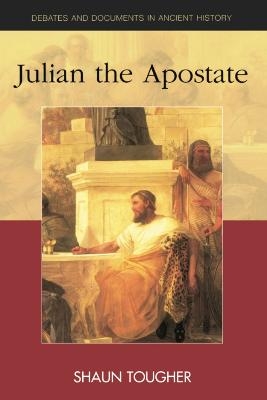
Julian the Apostate
Edinburgh University Press (Verlag)
978-0-7486-1887-3 (ISBN)
This new study of the last pagan Roman emperor provides remarkable insight into the man and his times. The figure of Julian demands the attention of historians. As the last pagan Roman Emperor, he provides a focus for studying the religious transformations that were taking place in the empire in the fourth century. Further, his secular policies and concerns concentrate attention on other transformations -- social and political -- within the period. Notably, Julian elicited sharply divided opinion from his contemporaries, which is largely polarised between pagan supporters and Christian opponents. Such division of opinion is also matched by the modern literature on him. Was he the prospective saviour of the Roman Empire, or was he out-of-touch and living in the past? Was he an evangelist for Mithraism, or an altogether more traditional pagan? Was he a shrewd military man, or a rash risk-taker whose luck spectacularly ran out on his Persian expedition? These questions and more are asked and discussed, allowing students to reach their own verdict on this exciting and controversial emperor.
Key Features: *Issues of historical significance are identified and discussed *Key passages of text are gathered and accessible in one volume *Modern interpretations of Julian are presented and considered
Shaun Tougher is a Lecturer in Ancient History at Cardiff University. He is series editor (with Emma Stafford, University of Leeds) of the Debates and Documents in Ancient History Series.
Series Editors' Preface; Preface; Acknowledgements; Abbreviations; Family Tree; Maps; Part I Debates; Introduction: The Fascination of Julian; 1. Family; 2. Conversion; 3. Gaul; 4. Emperor: Style and Reform; 5. Religion; 6. Persia; Conclusion: The Elusiveness of Julian; Part II Documents; 1 Julian: Panegyric on the Emperor Constantius; 2 Julian: Panegyric on the Empress Eusebia; 3 Julian: On the Deeds of the Emperor Constantius or On Kingship; 4 Julian: Consolation to Himself on the Departure of the Excellent Salutius; 5 Julian: Letter to Priscus; 6 Julian: Letter to Oribasius; 7 Julian: Letter to the Athenians; 8 Julian: Letter to Maximus the Philosopher; 9 Julian: Letter to Themistius the Philosopher; 10 Julian: Letter to the Philosopher Maximus; 11 Julian: Letter to Bishop Aetius; 12 Julian: Letter to the People of Alexandria; 13 Julian: Letter to Ecdicus, Prefect of Egypt; 14 Julian: Against the Cynic Heraclius; 15 Julian: To the Alexandrians, an Edict; 16 Julian: Letter to Evagrius; 17 Julian: Letter to the Thracians; 18 Julian: Letter to the High-priest Theodorus; 19 Julian: To the Mother of the Gods; 20 Julian: Letter to Arsacius, High-priest of Galatia; 21 Julian: Letter to Atarbius; 22 Julian: Rescript on Christian Teachers; 23 Julian: Letter to the Citizens of Bostra; 24 Julian: Letter to the Alexandrians; 25 Julian: The Caesars; 26 Julian: To King Helios; 27 Julian: Letter to a Priest; 28 Julian: Misopogon; 29 Inscriptions; 30 Theodosian Code; 31 Sextus Aurelius Victor: De Caesaribus; 32 Claudius Mamertinus: Speech of Thanks to Julian; 33 Libanius: Letter to Julian; 34 Libanius: Address to Julian; 35 Libanius: To Julian on behalf of Aristophanes; 36 Libanius: Address to the Emperor Julian as Consul; 37 Libanius: The Embassy to Julian; 38 Libanius: Letter to Aristophanes; 39 Libanius: Funeral Oration for Julian; 40 Libanius: Upon Avenging Julian; 41 Libanius: Autobiography; 42 Salutius: Concerning the Gods and the Universe; 43 Gregory of Nazianzus: Against Julian 1; 44 Gregory of Nazianzus: Against Julian 2; 45 Ephrem the Syrian: Hymns against Julian; 46 Eutropius: Breviarium; 47 Festus: Breviarium; 48 John Chrysostom: Homily on St Babylas; 49 Jerome: Chronicon; 50 Ammianus Marcellinus: Res Gestae; 51 Eunapius: History (fragments); 52 Eunapius: Lives of the Sophists; 53 Epitome De Caesaribus; 54 Rufinus: Church History; 55 Orosius: History against the Pagans; 56 Philostorgius: Church History; 57 Socrates: Church History; 58 Sozomen: Church History; 59 Theodoret: Church History; 60 Zosimus: New History; 61 Malalas: Chronicle; 62 Zonaras: Chronicle; 63 Coin of Julian as Caesar; 64 Coin of Julian as Augustus; 65 Julian's Bull Coin; 66 Statue of Julian; 67 Edward Armitage: Julian the Apostate Presiding at a Conference of Sectarians; Chronology; Further Reading; Essay Questions; Bibliography; Websites; Index.
| Erscheint lt. Verlag | 26.1.2007 |
|---|---|
| Zusatzinfo | Illustrations |
| Verlagsort | Edinburgh |
| Sprache | englisch |
| Maße | 156 x 234 mm |
| Gewicht | 340 g |
| Themenwelt | Literatur ► Biografien / Erfahrungsberichte |
| Geschichte ► Allgemeine Geschichte ► Vor- und Frühgeschichte | |
| Geisteswissenschaften ► Geschichte ► Regional- / Ländergeschichte | |
| Geisteswissenschaften ► Philosophie ► Philosophie des Mittelalters | |
| Geisteswissenschaften ► Religion / Theologie | |
| ISBN-10 | 0-7486-1887-2 / 0748618872 |
| ISBN-13 | 978-0-7486-1887-3 / 9780748618873 |
| Zustand | Neuware |
| Haben Sie eine Frage zum Produkt? |
aus dem Bereich


